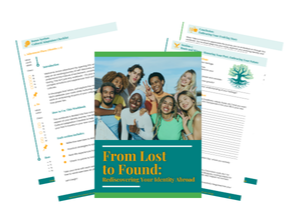⏰ Breaking the Cycle: Immigrant Burnout & Imposter Syndrome
Jan 29, 2025
First-generation immigrants carry more than just their careers on their shoulders – they carry the weight of cultural expectations, family sacrifices, and constant self-doubt. This hidden burden creates a dangerous cycle where imposter syndrome feeds into burnout, affecting both rising professionals and established leaders in immigrant communities.

My stomach clenches when I hear those words: "You don't sound South African."
I lead teams. I make decisions. I drive results. Yet in meetings, I catch the subtle glances when my accent shifts. I notice the extra questions about my approach. I feel the weight of representing not just myself, but every immigrant professional who will come after me.
This is the reality of being a South African leader in Australia. On paper, it should work perfectly – same language, similar culture, familiar business world. But the truth cuts deeper. Every day, I navigate the space between fitting in and staying true to who I am.
This constant pressure creates a brutal cycle. We doubt ourselves, so we work harder. We work harder, so we burn out. We burn out, so we doubt ourselves more. This is how imposter syndrome traps immigrant professionals in a cycle of exhaustion.

The Mental Health Toll of Imposter Syndrome in Immigrant Communities
Recent studies reveal that 70% of first-generation immigrant professionals experience significant imposter syndrome, with 65% reporting related burnout symptoms. What many don't see is how this constant navigation affects our mental health.
The perpetual stress of proving ourselves manifests in concrete ways:
Anxiety Becomes Our Constant Companion
- Racing thoughts before every meeting
- Obsessive preparation for presentations
- Hypervigilance about our communication style
- Constant fear of confirmation bias about our abilities
Depression Often Follows Burnout
- Feeling disconnected from both our home and adopted cultures
- Struggling to celebrate achievements
- Withdrawing from social connections
- Physical exhaustion from emotional labour
"The similarities between our home and adopted countries create an expectation of seamless integration, making it even harder to acknowledge our struggles."
The Hidden Costs of Cultural Adaptation
First-generation immigrant professionals face unique challenges that compound traditional workplace stress:
Invisible Labour
Every day, we navigate:
- Cultural nuances in professional settings
- Communication gaps, despite sharing a language
- Relationships across multiple time zones
- The weight of representing our entire community
Cultural Expectations
The pressure manifests through:
- Conflicting definitions of success between cultures
- Family obligations that span continents
- The need to honour sacrifices made for our opportunities
- Constant code-switching between cultural contexts

Breaking Free: Practical Steps for Immigrant Professionals
- Recognise Your Worth
Your unique perspective enriches your workplace. When I stopped apologising for my "foreign" approach and started sharing my distinctive viewpoints, my team found innovative solutions to long-standing problems. This shift from viewing difference as a liability to seeing it as an asset directly counters imposter syndrome's core belief that we don't belong.
- Build Your Support Network
- Connect with other first-generation immigrants who understand your challenges
- Join professional groups for immigrant leaders to share strategies and successes
- Seek mentors who understand your journey and can validate your experiences
- Create safe spaces for sharing challenges without judgment
This network becomes crucial when imposter feelings surge or burnout threatens – having others who understand your experience provides both emotional support and practical strategies for coping.
- Protect Your Mental Health
- Schedule regular check-ins with mental health professionals who understand immigrant experiences
- Practice cultural self-care rituals that keep you connected to your roots
- Set boundaries around work availability to prevent burnout
- Maintain connections with your heritage to stay grounded
These practices help break the cycle of overwork and self-doubt by prioritizing your well-being over the constant pressure to prove yourself.
- Navigate Professional Relationships
- Communicate your needs clearly to prevent overwhelm
- Share your cultural insights as strengths rather than apologizing for differences
- Build allies among colleagues who can advocate for your perspectives
- Document your achievements to combat imposter syndrome's tendency to minimize successes
Each of these strategies addresses both the external pressures that lead to burnout and the internal doubts that fuel imposter syndrome. By implementing them together, you create a sustainable approach to professional growth that doesn't compromise your well-being or cultural identity.

What Organisations Can Do: A Case Study
[Success Story: Global Tech Firm in Sydney] After implementing a comprehensive support program for immigrant professionals, including:
- Culturally sensitive mentorship matching
- Flexible time-off policies for international commitments
- Mental health resources in multiple languages
- Regular cultural competency training
The company saw:
- 40% reduction in burnout reports
- 35% increase in immigrant employee retention
- 50% more immigrant professionals in leadership roles
- Improved innovation metrics across teams
Moving Forward: Breaking the Cycle
Understanding imposter syndrome in immigrant communities isn't just about identifying problems – it's about creating sustainable solutions that acknowledge our unique challenges. The intersection of cultural adaptation, professional pressure, and mental health demands a holistic approach to breaking this cycle.
As first-generation immigrants, we bring valuable perspectives and resilience to our workplaces. Our experience navigating multiple cultures enhances problem-solving and innovation. The key is learning to leverage these strengths while protecting our mental health and maintaining our authentic selves.
The path forward requires action at both individual and organizational levels. While we work on personal strategies to combat imposter syndrome and prevent burnout, workplaces must create environments where immigrant professionals can thrive without compromising their cultural identity or well-being.
Remember, seeking support isn't a sign of weakness – it's a recognition of the complex challenges first-generation immigrants face in professional settings. By addressing imposter syndrome in immigrant communities openly and implementing targeted solutions, we can create a more inclusive and sustainable work environment for all.
Key Takeaways
- Imposter syndrome affects 70% of first-generation immigrant professionals
- Mental health support is crucial for sustainable success
- Cultural adaptation requires significant emotional labour
- Organizations play a vital role in creating inclusive environments
- Building support networks helps break the cycle
Call to Action
Share your story in the comments below or join our community of first-generation immigrants supporting each other through these challenges. Together, we can create workplaces where our differences are celebrated, not just tolerated.
Ready to thrive in your new country? Join my exclusive program and secure your spot to unlock a life where your unique identity flourishes. Limited spots available. Don’t miss out on this holistic journey to success.
Stay connected with news and updates!
Join our mailing list to receive the latest news and updates from our team.
Don't worry, your information will not be shared.
We hate SPAM. We will never sell your information, for any reason.




